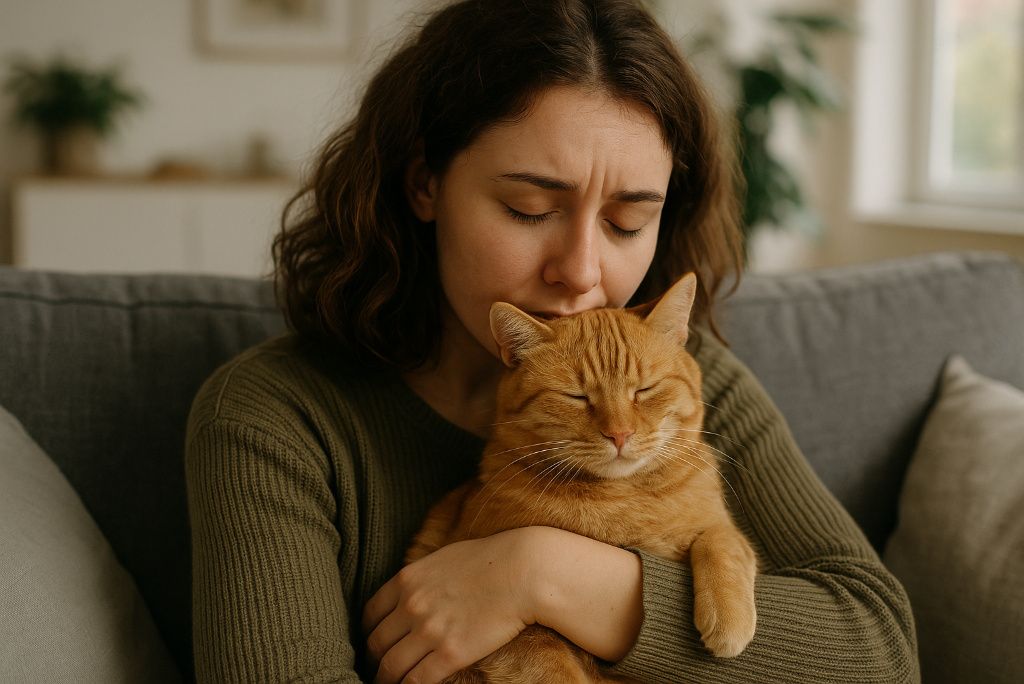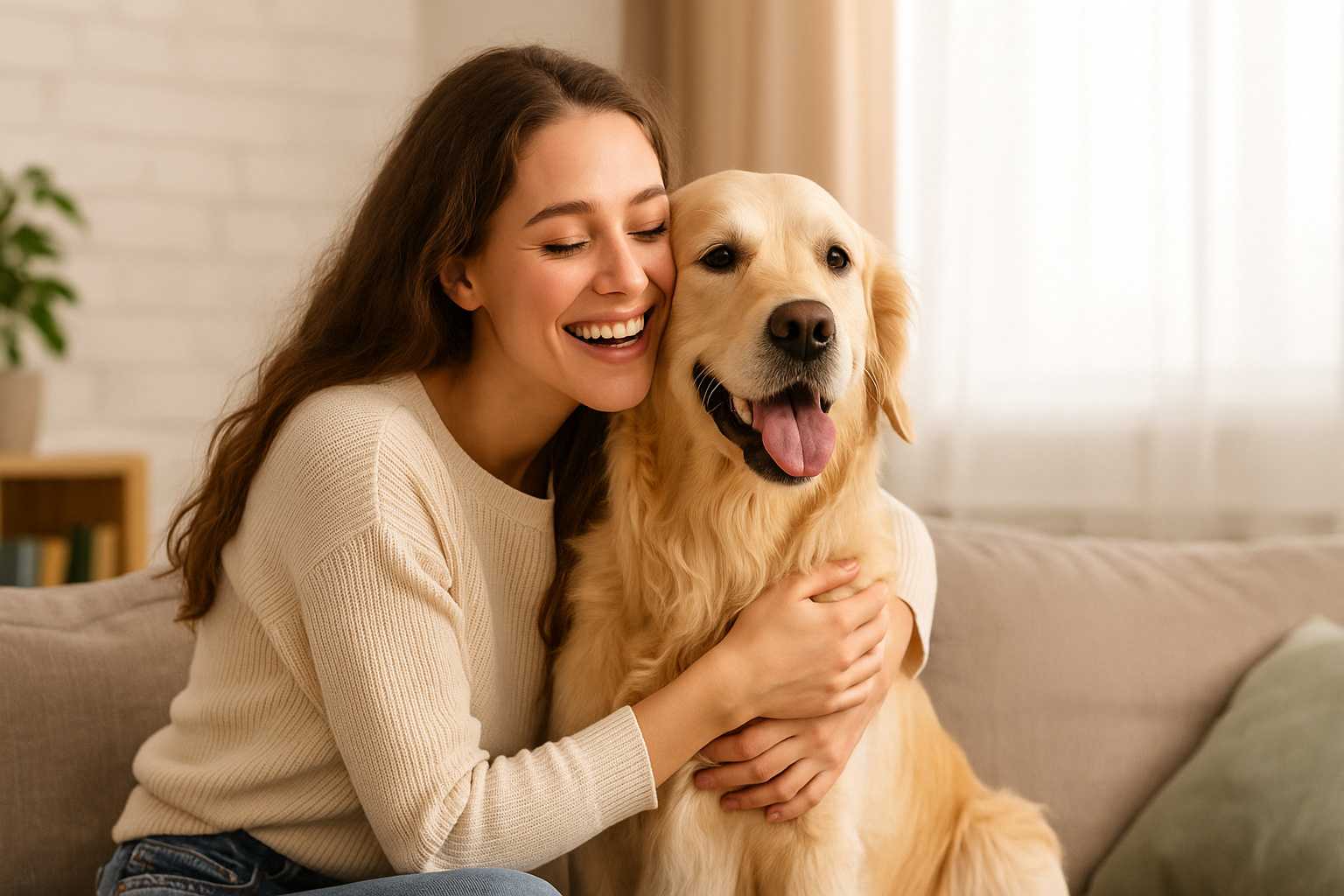Few things in life can match the simple joy of a wagging tail, a gentle purr, or the bright eyes of a devoted companion. Pets offer far more than cuddles—they profoundly impact mental and emotional health in ways backed by science.
Whether it’s easing stress, creating daily structure, or combating loneliness, animals weave themselves into the emotional fabric of our lives, bringing comfort and purpose. Let’s explore how pets enrich our well-being in ways that are both powerful and deeply personal.
1. Stress Reduction

Spending time with animals can dramatically lower stress levels. Studies show that petting a dog or cat reduces cortisol, the hormone linked to stress, while boosting serotonin and dopamine, which promote calm and happiness. Even simply watching fish swim in an aquarium can produce a meditative effect. Hospitals and therapy programs increasingly incorporate animals for stress relief in patients and staff.
The rhythmic act of brushing a pet’s fur or feeling a warm body curled up next to you can soothe nerves after a long day. According to the American Heart Association, interacting with pets can decrease blood pressure and heart rate, contributing to overall cardiovascular health. Learn more from American Heart Association.
2. Combatting Loneliness

Loneliness isn’t just unpleasant—it can be as harmful as smoking 15 cigarettes a day, according to research. Pets provide constant companionship and an emotional connection that wards off feelings of isolation. For seniors or people living alone, a pet can fill the silence and provide comforting presence.
Even talking to pets helps individuals process thoughts and emotions. Studies from the National Institutes of Health suggest that pet owners report feeling less lonely compared to non-pet owners, highlighting the powerful social support animals offer. Learn more at the NIH.
3. Encouraging Physical Activity

Pets, particularly dogs, motivate owners to get outside and move. Daily walks, trips to the park, or playful fetch sessions keep both humans and animals fit. Physical exercise, in turn, boosts mood and reduces anxiety and depression symptoms.
One study published in BMC Public Health found that dog owners walk nearly twice as much as those without dogs, resulting in lower rates of obesity and better mental health. Even activities like cleaning a birdcage or engaging a cat in play help create an active routine. Read the full study on BMC Public Health.
4. Building Routine and Responsibility

Pets thrive on routine: regular feeding times, bathroom breaks, and play sessions. This predictable schedule can be especially helpful for individuals managing anxiety or depression, creating a daily anchor that brings purpose and focus. Caring for a pet fosters responsibility, organization, and time management skills.
Young children, in particular, can learn accountability and empathy through pet care. A study published in the Journal of Psychiatric Research found that routines tied to pet ownership contribute to stability and reduced symptoms in mental health disorders. Explore more on Journal of Psychiatric Research.
5. Emotional Support and Empathy

Animals possess an incredible ability to sense human emotions. Dogs, for instance, often comfort people who are sad or anxious, offering silent, non-judgmental companionship. This emotional attunement can help people feel seen and valued, boosting self-esteem.
Children with emotional challenges often bond closely with animals, learning empathy and compassion. Therapy animals are widely used to help individuals cope with grief, trauma, or PTSD. An article in Psychology Today emphasises that simply being with pets fosters empathy and emotional growth. Learn more from Psychology Today.
6. Social Connection

Pets are social magnets. Dog owners, for example, often strike up conversations with fellow dog walkers, building community ties. Owning a pet creates natural opportunities for social engagement, from visiting dog parks to attending pet-centred events.
These casual interactions can help shy or introverted people practise social skills and reduce social anxiety. Research from the University of Western Australia found that pet ownership significantly increases neighbourhood social capital. Dive deeper into this topic at UWA News.
7. Emotional Regulation

Pets can serve as emotional regulators, helping people calm down during moments of distress. Stroking a cat, holding a rabbit, or talking to a bird can provide a tactile and emotional outlet that grounds individuals during high-stress episodes.
Studies in the Journal of Behavioral Medicine confirm that human-animal interactions can lower physiological markers of stress, offering a soothing presence when emotions run high. See details in Journal of Behavioral Medicine.
8. Boosting Mood and Happiness

Pet owners frequently report feeling happier, thanks to the unconditional love and joyful antics of their animals. The release of “feel-good” hormones, like oxytocin, occurs when interacting with pets, leading to an elevated mood.
A playful puppy, a chirping parrot, or an affectionate cat can inject moments of laughter into daily life, reducing symptoms of depression. A Harvard Medical School report notes that pets can act as a buffer against life’s daily stresses, contributing to greater overall life satisfaction. Read more from Harvard Health.
9. Sense of Purpose

Caring for a pet can give individuals a strong sense of purpose. Knowing that an animal relies on you for food, exercise, and companionship fosters a feeling of being needed, which is critical for mental health.
This is especially true for those facing life transitions, such as retirement or empty-nest syndrome. Studies in Ageing & Mental Health journal found that pet ownership correlates with higher life satisfaction among older adults. Discover the research in Aging & Mental Health.
10. Helping Children Develop Social Skills

Children who grow up with pets often develop stronger social skills and higher levels of empathy. Caring for animals teaches compassion, responsibility, and patience. Interacting with pets also helps kids learn non-verbal communication cues.
The CDC reports that children with pets are less likely to develop anxiety and more likely to engage in social activities. In therapy settings, animals help children open up and express feelings. Read about the CDC’s findings on pets and children at CDC.
11. Supporting Recovery from Trauma

Pets can play a crucial role in healing from trauma. Survivors of abuse, veterans with PTSD, or individuals recovering from accidents often find comfort and reassurance in animal companionship. Service dogs are trained to recognise panic attacks or nightmares and intervene to calm their owner.
A report from the Department of Veterans Affairs highlights how therapy dogs contribute to reduced PTSD symptoms. See the VA’s resources on Department of Veterans Affairs.
12. Improving Mindfulness

Pets live in the moment, a trait humans often struggle to emulate. Spending time with animals encourages mindfulness—a mental state focused on the present rather than past regrets or future anxieties. Simple activities like playing fetch, watching fish swim, or grooming a horse draw attention into the “now.” Mindfulness has been shown to reduce stress and improve mental clarity. Mindful.org suggests that animals can be excellent teachers of present-moment awareness. Learn more at Mindful.
13. Easing Grief

Grieving individuals often find solace in pets. Animals provide quiet companionship, unconditional love, and a sense of normalcy when life feels upside-down. The simple act of caring for a pet can create small moments of routine that anchor a grieving person.
Studies published in Death Studies journal found that pet ownership helped some bereaved individuals cope more effectively. Find insights in Death Studies.
14. Enhancing Self-Esteem

People with pets often report higher self-esteem. Caring for an animal successfully can boost feelings of competence and value. Pets offer unconditional positive regard, which can be especially empowering for people struggling with self-image.
A survey published in the Journal of Personality and Social Psychology showed that pet owners feel more confident in social situations and life in general. Review the findings in JPSP.
15. Creating Joyful Memories

At the heart of pet ownership are countless joyful memories—from the first time a puppy chases a ball to the quiet evenings a cat sleeps beside you. Pets often become intertwined with the happiest moments of life, offering stories and laughter that last for years.
These positive memories can serve as emotional resources during difficult times, reminding owners of joy and resilience. The American Veterinary Medical Association notes how pets enrich lives by creating enduring bonds and shared experiences. Learn more from AVMA.
Disclaimer: This article is for informational purposes only and is not a substitute for professional medical, mental health, or veterinary advice. Always consult qualified professionals regarding health and wellness decisions.

